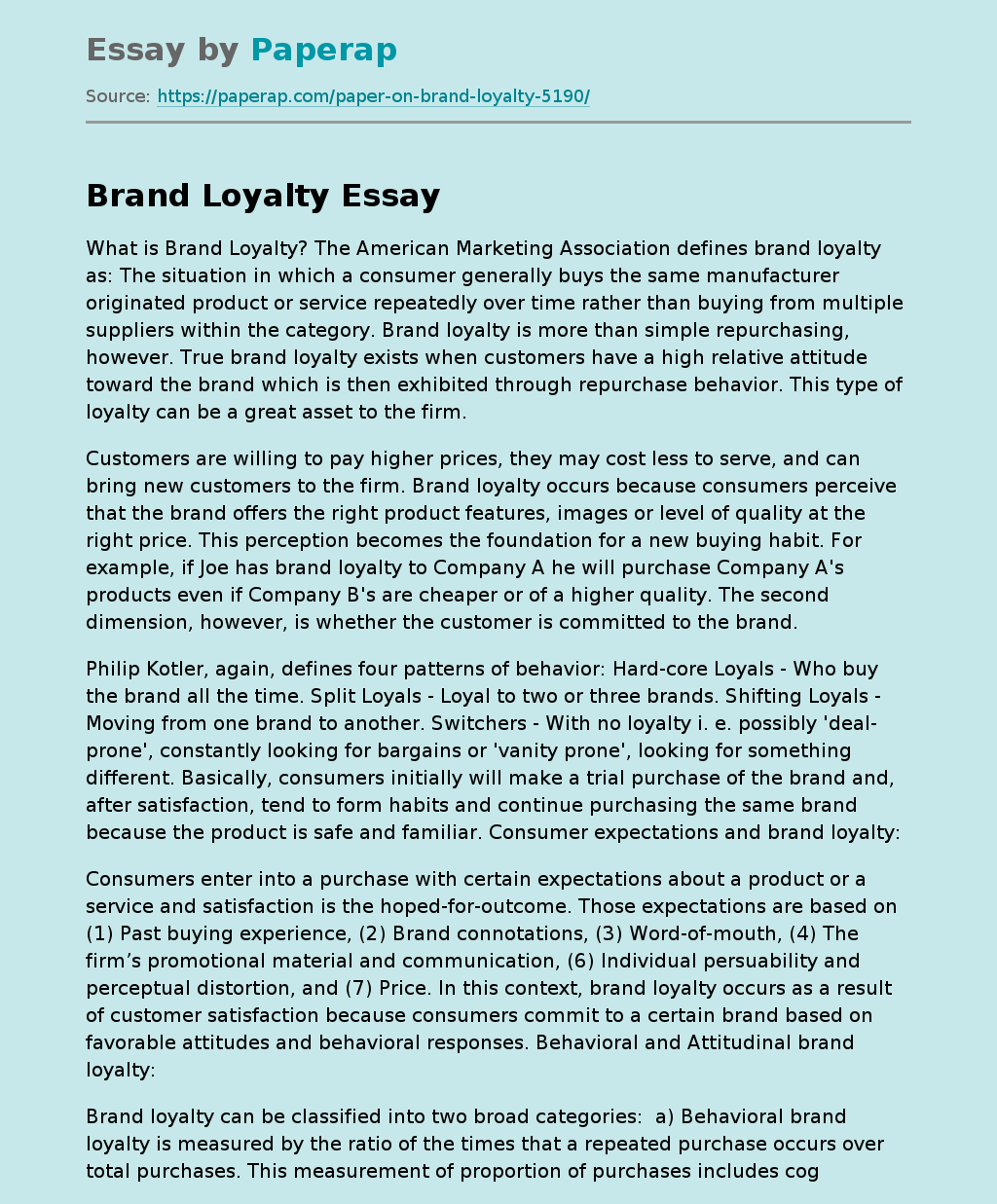Understanding Brand Loyalty.
What is Brand Loyalty? The American Marketing Association defines brand loyalty as: The situation in which a consumer generally buys the same manufacturer originated product or service repeatedly over time rather than buying from multiple suppliers within the category. Brand loyalty is more than simple repurchasing, however. True brand loyalty exists when customers have a high relative attitude toward the brand which is then exhibited through repurchase behavior. This type of loyalty can be a great asset to the firm.
Customers are willing to pay higher prices, they may cost less to serve, and can bring new customers to the firm. Brand loyalty occurs because consumers perceive that the brand offers the right product features, images or level of quality at the right price. This perception becomes the foundation for a new buying habit. For example, if Joe has brand loyalty to Company A he will purchase Company A’s products even if Company B’s are cheaper or of a higher quality.
The second dimension, however, is whether the customer is committed to the brand.
Philip Kotler, again, defines four patterns of behavior: Hard-core Loyals – Who buy the brand all the time. Split Loyals – Loyal to two or three brands. Shifting Loyals – Moving from one brand to another. Switchers – With no loyalty i. e. possibly ‘deal-prone’, constantly looking for bargains or ‘vanity prone’, looking for something different. Basically, consumers initially will make a trial purchase of the brand and, after satisfaction, tend to form habits and continue purchasing the same brand because the product is safe and familiar.
Consumer expectations and brand loyalty:
Consumers enter into a purchase with certain expectations about a product or a service and satisfaction is the hoped-for-outcome. Those expectations are based on (1) Past buying experience, (2) Brand connotations, (3) Word-of-mouth, (4) The firm’s promotional material and communication, (6) Individual persuability and perceptual distortion, and (7) Price. In this context, brand loyalty occurs as a result of customer satisfaction because consumers commit to a certain brand based on favorable attitudes and behavioral responses. Behavioral and Attitudinal brand loyalty:
Brand loyalty can be classified into two broad categories: a) Behavioral brand loyalty is measured by the ratio of the times that a repeated purchase occurs over total purchases. This measurement of proportion of purchases includes cognitive, affective and co native features, which imply an indirect relationship between brand loyalty and customer satisfaction. In other words, considerations of customers’ perceptions about a brand can make or break a firm’s branding strategy in the context of repetitive purchases when measuring brand loyalty levels. ) Attitudinal brand loyalty holds that brand loyalty involves a favorable attitude which reflects a preference or commitment expressed over time. This argument implies that consumers like the particular firm more than its competitors and therefore they express a favorable preference over the firm’s products or services. Both behavioral and attitudinal brand loyalty consider that consumer have developed a feeling of favorable attitudes towards the organization and therefore they engage in repeat purchases.
However, marketing studies hold that, often, repeat purchases occur as a result of convenience or lack of alternatives bearing no intentional component. Factors influencing brand loyalty: It has been suggested that loyalty includes some degree of pre-dispositional commitment toward a brand. Brand loyalty is viewed as multidimensional construct. It is determined by several distinct psychological processes and it entails multivariate measurements. Customers’ perceived value, brand trust, customers’ satisfaction, repeat purchase behavior, and commitment are found to be the key influencing factors of brand loyalty.
Commitment and repeated purchase behavior are considered as necessary conditions for brand loyalty followed by perceived value, satisfaction, and brand trust. Fred Reichheld, one of the most influential writers on brand loyalty, claimed that enhancing customer loyalty could have dramatic effects on profitability. Among the benefits from brand loyalty. Specifically, longer tenure or staying as a customer for longer was said to be lower sensitivity to price. This claim had not been empirically tested until recently.
Recent research found evidence that longer-term customers were indeed less sensitive to price increases. Benefits of brand loyalty: The benefits of brand loyalty for a firm are numerous. First of all, loyal customers are less price- sensitive, which means that they are ready to pay a higher price, if required, in order to acquire the product or service. As a result, apart from higher profitability for the firm, the cost incurred for pursuing new customers is reduced. Loyal customers are also strong advocates of the firm playing a powerful role in the decision making process of other people.
The word-of-mouth advertisement is a strong marketing tool that improves the firm’s reputation and brings certainty to the firm by enlarging its customer base. In addition, loyal customer expose higher tolerance for mistakes, are willing to provide feedback for any unfulfilled needs, to try additional products and to offer a higher share of wallet. In today’s highly competitive environments, improving consumers’ loyalty to brands permits marketers to maintain a comfortable and lasting position in the marketplace.
The issue of brand loyalty has been examined at great length. Branding is by far one of the most important factors influencing an item’s success or failure in the marketplace, and can have a dramatic impact on how the “company behind the brand” is perceived by the buying public. In other words, the brand is not just a representation of a company’s product; it is a symbol of the company itself, and that is where the core of brand loyalty lies. Therefore, a strong brand is more than just a name; it is a promise that can be trusted.
Understanding Brand Loyalty.. (2018, Feb 07). Retrieved from https://paperap.com/paper-on-brand-loyalty-5190/

